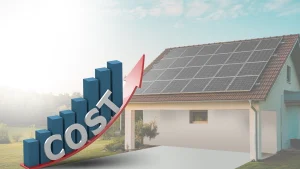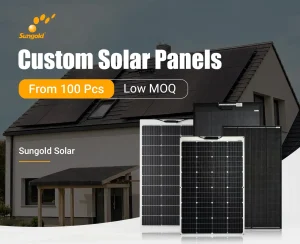When Freeze Warnings hit (people often search what is a freeze warning or whats a freeze warning), facilities face downtime, pipe bursts, and control failures. This guide delivers a Before–During–After playbook: a risk map to find cold spots, solution patterns to keep “life-line loads” alive, a 72-hour checklist, and a simple ROI model—paired with Sungold custom off-grid power and anti-shade PV—to deploy in 72 hours.
What is a Freeze Warning—and why should industrial sites care?
A Freeze Warning signals near-term temperatures at/ below freezing requiring immediate actions. See the official NWS glossary for Freeze Warning definition (NWS) and broader freeze / watch terminology. NWS also summarizes cold weather alerts here: Understanding Cold Weather Alerts. In mild climates, a rare California freeze warning still threatens uninsulated lines; refer to local NWS offices like NWS Los Angeles or hazard criteria pages such as NWS Spokane definitions and NWS Boston criteria for regional thresholds.
How do we map industrial risks under Freeze Warnings?
Build a layered risk map that connects assets → failure modes → consequences → priority:
Water & condensate:raw/cooling/condensate/drains;find low points & dead legs;mark flush valves.
Process & HVAC:coils, cooling towers, FCUs, compressed-air condensate traps.
I&C & comms:RTU/PLC cabinets, valve actuators, field cameras/routers—check glands/seals and add small anti-condensation heaters.
Power & survival loads:identify life-line circuits(heat-trace controllers, sensors, telemetry, valve hold)。
People & routes:exposure limits, night patrol routes, contractor alignment.
Compliance & evidence:maintenance logs, temp trends, freeze drills, photos.
Before the Freeze: what should we prepare?
Asset triage:A(no-downtime life-line)/B(quality impact)/C(deferable)。
Insulation & heat-trace:audit insulation thickness/aging;validate heat-trace power density, loop continuity, leakage current;add redundant controllers for A-tier.
Outdoor enclosures:add heater pads, door seals, desiccant;label glands & drip holes;verify IP ratings.
Fire sprinklers:distinguish wet/dry zones;drain low points;verify supervised valves.
Power resilience:plan survival power for small critical loads—if mains/genset fail, these must stay alive.
Monitoring & automations:set thresholds, auto cold-mode on Freeze Warnings/freeze alerts, cloud dashboards, dual-path comms (cellular + LoRa/wired).
People & spares:night shifts, route maps, spare heaters/glands/relays/cables;contractor on-call SLAs.
- Sungold Solution |
For distributed small critical loads, deploy Sungold custom off-grid blocks:
• Non-standard PV at 12/24/48 V bus to reduce conversion loss
• PA621 anti-shade for low sun/partial shading during Freeze Warnings
• PA219/TF flexible PV for curved tanks/railings (lightweight mounting)
• MPPT + LiFePO4 with low-temperature policy, enclosure options
• Full engineering pack:wiring, fusing, grounding, hole map, torque
During the Freeze: what operating rules cut risk?
Protect life-line circuits:sample heat-trace controller currents;watch for abnormal drops/spikes;keep critical loops circulating.
Load shedding:temporarily switch off non-critical HVAC/lighting to preserve battery/aux power for survival loads.
Relentless monitoring:log temp/flow/pressure every 4 h;enable dual-path comms(cellular + LoRa/wired)。
Safety management:no ad-hoc open flames;tighten hot-work permits;ice hazard control on walkways.
Fallback plays:temporary bypass/drain at known cold spots;activate contractor SLA.
After the Freeze: what inspections speed recovery?
Mechanical walkdown:check flanges/valves/coils/supports for leaks/stress;inspect insulation wet spots.
Electrical health:insulation resistance & load tests for heat-trace;cabinet condensation/corrosion remediation。
Data review:trend temperatures, alarms, response times;tag repeat cold-spots.
Continuous improvement:update RPN; feed lessons into next year’s winterization budget and spares strategy.
Which custom protection architectures actually work?
Scenario A|Remote valve/measurement skids(no utility power)
Loads:valve hold, RTU, temp probes, small heat-trace controllers
Pattern:DC-coupled PV(Sungold)→ MPPT → LiFePO4(12/24/48 V)→ DC bus / inverter(if needed)
Notes:optimize for winter HSP, anti-shade PV strings, low-temp BMS, vandal-resistant enclosures
Scenario B|Outdoor cabinets & poles
Loads:anti-condensation heaters, camera, router
Pattern:Flexible PV(PA219/TF) + compact LiFePO4 + low-temp policy;consider wind load & anti-theft
Scenario C|Pump rooms & low-point loops
Loads:small circulation pump, thermostats, P/F/T transmitters
Pattern:PV + battery for controls/telemetry;mains/gen-set for motive power;survival mode on outage
Sizing quick-formulas & worked example
Wh/day ≈ Σ(load W × hours × duty cycle)
PV(W) ≈
Wh_day ÷ (HSP × η_sys) × (1 + margin)Battery(Wh) ≈
Wh_day × autonomy_days ÷ DoD × (1 + margin)
Example:controls ~30 W avg → 720 Wh/day;winter HSP=3,η_sys=0.75 → PV ≈ 720/(3×0.75)= 320 W;+30% margin ≈ 416 W → choose 2×250 W.
Battery for 2 days, DoD=0.8, +20% margin:720×2/0.8×1.2 ≈ 2160 Wh(≈90 Ah @24 V)。
How does Sungold land a fit-for-purpose solution?
PA621 anti-shade:stable input under low sun/shadows typical during Freeze Warnings.
PA219/TF flexible:curved tanks/railings;lightweight, low drilling; marine-grade laminates optional.
SGM Rigid solar:long-exposure rooftops/yards with standard racks.
Non-standard builds:target voltage, outline, hole map, back-exit leads, connectors, cable routing—fit first, wire clean.
Docs & delivery:wiring/fusing/grounding, torque specs, MPPT picks;IEC 61215/61730 path on request.
Process(<2 weeks typical for draft pack):
Asset list & load profile intake
Risk-tiering & circuit priority
Draft BOM + one-line + hole map
Field feedback → finalize
.

How to budget and model ROI for freeze alerts?
Downtime cost:loss/hr × at-risk hours + repair labor/material + penalties/SLA + customer impact.
Solution cost:custom PV + storage + controls/comms + installation;OPEX for inspections & battery refresh cycles.
Payback logic:If one incident costs $X and freeze alerts occur N times/yr, avoiding just one may justify CAPEX;many sites pay back within one winter.
- Policy & trends:For power-sector preparedness, cite NERC EOP-012-1 (PDF) and FERC approval of EOP-012-2 (Federal Register);also see NERC’s Cold Weather CMEP Practice Guide (2025, PDF) 与 FERC Reliability Spotlight。
KPIs:life-line uptime, alarm closure time, mean temp margin (ΔT above freezing), incident rate.
FAQ: what is a freeze warning—and more?
Q1. What is a freeze warning / whats a freeze warning vs freeze watch & hard freeze?
Watch = potential; Freeze Warning = near-term risk;Hard Freeze = colder/longer. Always act on freeze alerts with cold-mode.
Q2. Do mild regions (e.g., California) need this?(california freeze warning)
Yes—rare events cause outsized losses because assets aren’t winterized.
Q3. Can solar + battery carry heat-trace?
For controls/telemetry/small heaters—yes;size for winter irradiance and duty cycle;keep large AC heat-trace on mains/gen-set.
Q4. How to start with Sungold custom?
Send asset list + load profile → get non-standard PV/storage proposal with BOM + drawings.
Q5. What routine maintenance cuts freeze failures?
Annual insulation audits, heat-trace current sampling, cabinet seal checks, low-point drain tests, comms failover drills.
Final Thoughts
Freeze Warnings are a countdown for production and asset safety. A risk map, action checklist, and custom power blocks turn alerts into resilience. Share your asset list and load curve—Sungold will return a non-standard BOM & wiring draft plus a winterization checklist ready for the field.







